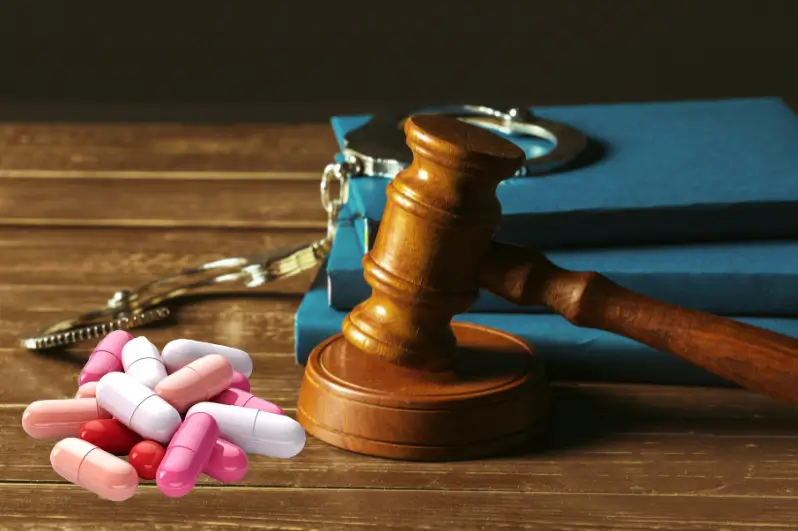The UAE is known for its strict stance on drug-related offenses, and the punishment for drug cases is severe, aiming to deter both locals and visitors from engaging in illegal drug use, possession, or trafficking. This harsh approach is a key part of the UAE’s broader efforts to maintain public safety and uphold its strong moral and legal standards. Understanding the legal framework and consequences of drug-related offenses in the UAE is essential for anyone living in or visiting the country.
In this article, we will delve into the punishment for drug case in UAE, offering a detailed look at the various penalties for different types of drug-related offenses.
If you are involved in a drug case in the UAE, please click the WhatsApp button at the bottom of the screen.
فهرس المقال
Punishment for Drug Case in UAE: Legal Framework
The UAE law is clear: drug-related offenses are met with severe penalties. The country operates under a zero-tolerance policy when it comes to illegal drugs, with the primary goal of protecting public order and safety. Both the Federal Law No. 30 of 2021 on Narcotic Drugs and Psychotropic Substances and other related legislation emphasize strict punishment for those involved in drug cases.
Punishment for Possession of Drugs
One of the most common drug-related offenses is possession, and the punishment for drug possession in the UAE can be severe. Even possessing a small amount of illegal drugs can lead to imprisonment, fines, and, in some cases, deportation (for non-citizens).
- Possession of small amounts: Individuals found with even small quantities of illicit drugs face prison sentences ranging from a few years to a decade, depending on the type of drug involved.
- Large quantities: For larger amounts of drugs, the penalties can be even more severe, often leading to longer prison terms and significant fines.
Punishment for Drug Trafficking and Distribution
Drug trafficking is one of the most serious offenses under UAE law, and the punishment for drug trafficking or distribution is extremely harsh. The penalties for drug trafficking can include life imprisonment or, in some cases, the death penalty.
- Trafficking: Those found guilty of trafficking drugs into or within the UAE face imprisonment for a minimum of 7 years, which can extend to a life sentence. The punishment may also involve significant financial penalties.
- Death penalty: The most severe punishment for drug trafficking is the death penalty, which is applicable in cases involving large-scale trafficking of narcotics.
Punishment for Drug Use
Drug use or consumption is also punishable in the UAE, and even testing positive for drugs can result in legal consequences. The punishment for drug use typically includes a prison sentence, which may be accompanied by mandatory rehabilitation.
- Drug use detection: If a person is caught using drugs, they face imprisonment for a period of up to 4 years.
- Mandatory rehabilitation: In addition to prison sentences, offenders may be required to undergo rehabilitation programs to reintegrate into society upon release.
Punishment for Drug Smuggling
Drug smuggling is a particularly serious offense, and the punishment for smuggling drugs into the UAE can be especially severe.
- Smuggling across borders: Individuals caught smuggling drugs across the UAE’s borders are likely to face the death penalty, especially if they are found to be involved in large-scale operations.
- Severe sentences: Even for those caught attempting to smuggle smaller amounts of drugs, the penalties include long prison sentences and heavy fines.
Legal Defenses and Mitigating Factors
Despite the severity of the punishment for drug case in UAE, there are certain defenses that can be presented in court, which could mitigate the punishment.
- Unintentional possession: In some cases, a defendant may argue that they did not knowingly possess the drugs. If proven, this could result in a lighter sentence or acquittal.
- First-time offenders: Courts may show leniency toward first-time offenders, potentially reducing the severity of the punishment or offering alternatives to prison, such as rehabilitation programs.
Legal Precedents in Drug Cases in the UAE
In the UAE, legal precedents set a strict tone in handling drug-related offenses. For instance, in recent years, several high-profile drug trafficking cases have resulted in long prison terms and significant fines for the accused, reinforcing the country’s firm stance against illegal drugs.
Moreover, courts have frequently imposed the death penalty in cases of large-scale drug trafficking, signaling that there are no exceptions for those caught in the act.
Frequently Asked Questions About Punishment for Drug Case in UAE
The punishment for drug case in UAE is severe, and the country’s laws reflect a zero-tolerance approach toward drug use, trafficking, and possession. Depending on the offense, the consequences range from lengthy prison sentences and hefty fines to the death penalty. Individuals facing drug-related charges should seek professional legal counsel to navigate the complexities of the UAE legal system.
Do not hesitate to contact us today for a consultation, from the top lawyers in Dubai.
Read more about UAE Drug Law Changed and Deportation No Longer a Must, and Punishment for Drug Trafficking in the UAE.




